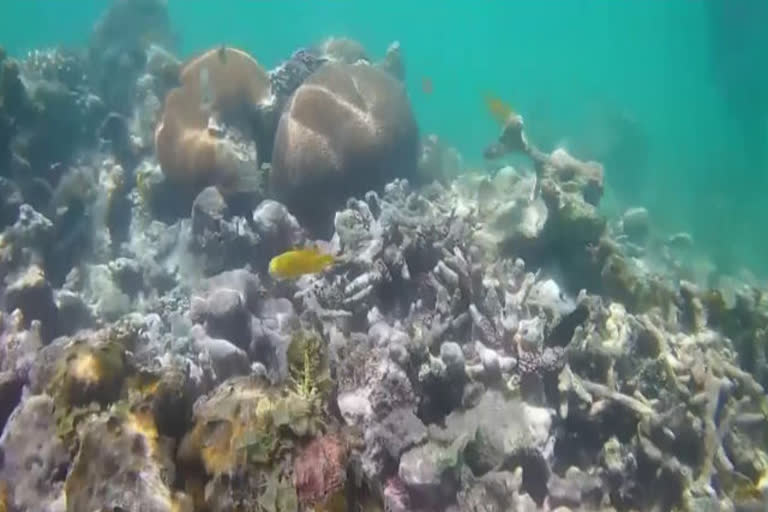Seychelles: Coral nurseries could be the answer to bleaching episodes caused by climate change, which are threatening complex underwater reefs around the world. In the Seychelles, marine biologists are rearing corals in specially-controlled nurseries, hoping they'll act as a "last-ditch safety stop" should ocean temperatures continue to rise.
Beneath the crystal-clear waters of the Indian Ocean around the Seychelles, coral reefs shelter a range of creatures, from tiny invertebrates to sprawling octopuses.
The fragile reefs act as both a protective barrier for coastlines and an attraction for tourists, who keep the country's economy going.
But the reefs are also one of the first victims of rising ocean temperatures.
In 1998, the Seychelles, in some areas, lost up to 90 percent of its coral reefs in an environmental event known as bleaching.
That's where coral in warming waters expel the colorful algae that live within their skeletons and, without their nutrients, starve.
Three years ago, rising ocean temperatures, thought to have been caused by the El Nino climate feature, destroyed around half the corals off Cerf Island, says marine biologist Leo Barret.
"We lost up to 50 percent of all corals, now three years ago in 2016," he says.
"This is mainly the branching corals, so we're talking about acropora, for example, and yeah, we lost up to 50 percent of these corals."
Conservationists have launched a number of reef restoration projects around the nation's 115 islands.
Barret and his colleagues from the Marine Conservation Society Seychelles (MCSS) have established several coral nurseries with the aim of rearing stronger corals.
Taking broken fragments, found around the reef, they rear them for a year, before transporting them to these artificial structures.
They have two large-scale nurseries off the coast of Cerf Island, each numbering around 2,500 corals.
"We try to restore the reef by using these nurseries, the nurseries help for the survival and the group of the corals," explains Barret.
The project is supported by several hotels on Cerf Island, a small holidaymaker island about four kilometres northeast of Mahe.
"The tourists here, they're attracted, okay by the beautiful landscape, but also by what is beneath, on the water," says Aurelie Duhec, a MCSS project leader.
"They want to meet with turtles, they want to see colourful fish. So, if we have just dead corals, we don't have all this."
According to a study published in the journal Science in February 2018, with further threats, including overfishing and pollution, coral reefs around the world will reach a tipping point before the end of the century, disappearing more quickly than they can restore themselves.
That's a threat even Cerf Island's coral nurseries can't escape.
So, on the island of Mahe, MCSS established this on-land coral nursery, the first of its kind on the Seychelles when it opened in September 2017.
Each tank is capable of holding some 100 coral fragments.
"We can control the temperature in here, so that even if everything dies out there, we've still got some remnants here that we can then grow up and put back out in the reef. So, if you like it's a last-ditch safety stop," explains David Rowat, the chairman and director of MCSS.
"However, the way that we try and do things is that the corals that we have in here are survivors, they have survived this previous bleaching attempt."
By rearing corals that survived the last bleaching episode, marine biologists hope to cultivate so-called "super corals", which may be more resilient to rising ocean temperatures.
"It's one of the most diverse habitats imaginable," says Rowat.
"Imagine a rainforest on steroids and that's what you have on a coral reef, it's just that people don't see it. People see the rainforest and they can see all of these different layers of complexity, with the different plants and the different animals inhabiting those niches. Exactly the same is true on the coral reef but multiplied so many different times."
There's broad scientific consensus that the effects of climate change have devastated the world's reefs, ravaging large swaths of the Great Barrier Reef in Australia, one of the natural wonders of the world.
Experts estimate that half of the corals that existed in the early 20th century have died.
Despite the negative outlook, Barret says he'll continue to protect Cerf Island's coral nurseries, hoping the human race might curb its climate emissions in the meantime.
"The thing is, what do you want your grandchildren to see?" he says.
"Do you want them to see a sea full of plastic pollution, full of bottles, or you want to be able to show the future generation coral reef, the fish biodiversity, this is something specific from the ocean, specific on the earth, so I think we need to preserve that."
Fanny Douvere, the coordinator of UNESCO's marine programme, says studies suggest all 29 coral reef systems inscribed on UNESCO's World Heritage List could be lost by 2100.
"If we're going for a business as usual scenario, where we continue to increase our climate emissions, then we are standing to lose the majority of those coral reef systems by 2100, that's at the end of this century, that's about 80 years from now," she says.
"It is quite substantial and quite important when you look at that."
This month the ambitious Nekton "First Descent" Indian Ocean mission will start surveying underwater life, plus map the sea floor and drop sensors to depths of up to 2,000 meters in the seas around the Seychelles. Coral reefs will form part of their research.
The mission will conclude with the State of the Indian Ocean Summit in 2022.
Also read- Scores missing after Nigeria pipeline blast
(With inputs from APTN)
